JUMP TO SECTION
AI-Led Interviews
Interview with AI: What It Means and How It’s Changing Hiring
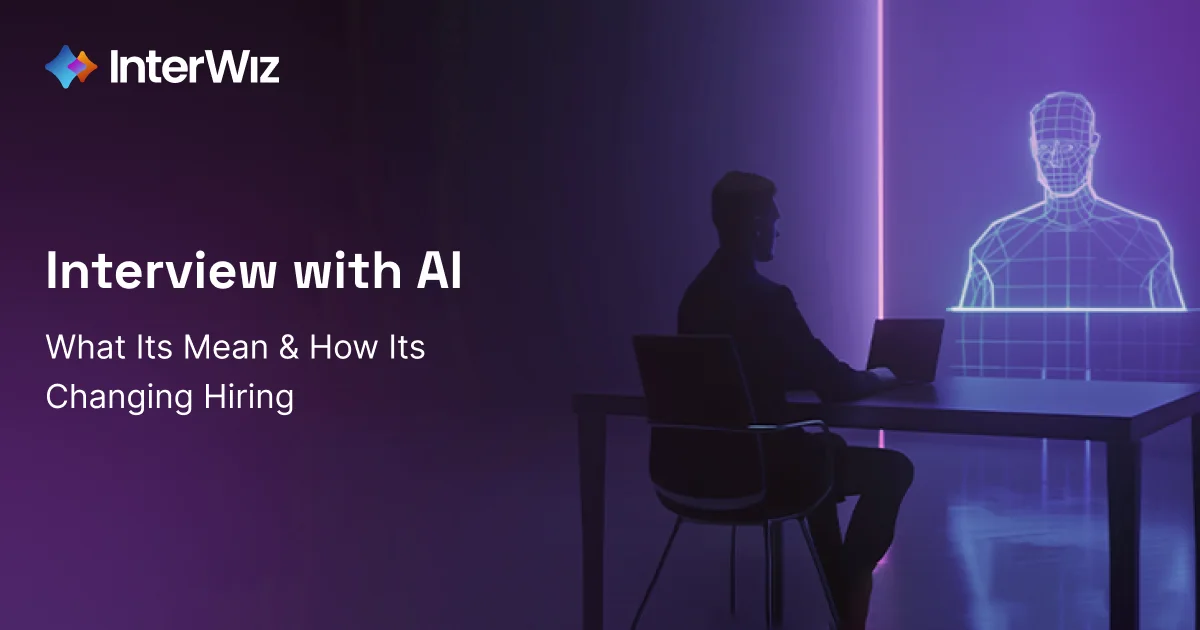
AI interviews are no longer a futuristic concept; they’re reshaping how companies evaluate talent today. By automating candidate assessments with algorithms, these systems promise faster decisions, greater consistency, and reduced bias. But what does it really mean to “interview with AI”? And how does it change the role of human recruiters?
In this article, we break down how AI interviews work, where they fit in the hiring funnel, and what both employers and candidates need to know to navigate them successfully. Whether you're exploring AI-led screening or rethinking your entire interview process, this guide will help you understand the real implications and opportunities of AI in hiring.
Key Takeaways
AI interviews streamline the hiring process, using algorithms to provide consistent, objective evaluations of candidates’ skills and potential fit.
While AI enhances efficiency and reduces bias, human oversight remains crucial to assess emotional intelligence and cultural fit in candidates.
The future of AI in recruitment involves a collaborative approach, where AI handles initial screenings, and humans focus on deeper evaluations and relationship building.
What Is an AI Interview and How Does It Work?
AI interviews are reshaping modern hiring by replacing subjective guesswork with structured, data-driven evaluations. Instead of relying solely on human instinct, these systems use natural language processing, machine learning, and real-time analytics to assess candidates’ communication, skills, and potential fit at scale.
Candidates typically engage in one of two formats: asynchronous video interviews or AI-led chat interviews. In both cases, responses are analyzed for verbal content, vocal tone, and even nonverbal cues like facial expressions or body language, depending on the platform’s capabilities and compliance settings.
What makes this approach powerful is its consistency. Every applicant is asked the same questions and evaluated against the same criteria, eliminating the variability and unconscious bias that can affect traditional interviews. It also frees up recruiter bandwidth by automating repetitive, early-stage screening.
Platforms like InterWiz take this further by combining AI-led interviews with role-specific skill assessments, from communication to analytical and coding abilities, ensuring candidates are evaluated holistically, not just on surface-level answers.
When implemented responsibly, AI-led interviews don’t just speed up hiring; they standardize quality, flag top candidates faster, and offer a more objective lens into potential performance.
Types of AI Interviews
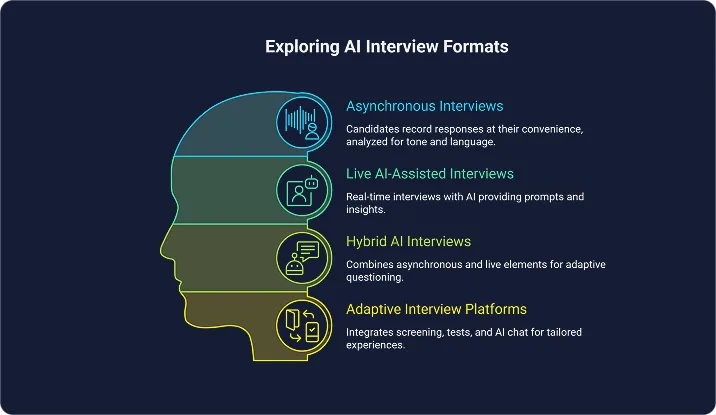
AI-powered interviewing comes in distinct formats, each optimized for different stages of hiring and candidate experience:
Asynchronous (One‑Way) Interviews: Candidates record responses to pre-set questions at their convenience. The platform analyzes spoken or written replies, often including tone, language, and behavioral cues, for structured evaluation. This method is standard for early-stage screening and supports scalable, bias-aware review.
Live AI‑Assisted Interviews: Conducted in real-time with human interviewers, AI tools listen in to provide live prompts, transcript analysis, and keyword insights post‑interview. The system augments interviewer judgment without making hiring decisions autonomously.
Hybrid AI Interviews: These combine asynchronous and live elements, often via AI-led chatbots that simulate dialogue while maintaining flexibility. Hybrid models offer adaptive questioning and can calibrate complexity based on the role and the candidate’s experience.
Adaptive Interview Platforms: Platforms like InterWiz integrate screening, role-based technical tests (e.g., live coding, analytical tasks), and adaptive AI chat interactions into a unified workflow. They tailor question difficulty by candidate seniority and role, ensuring fairness and relevance.
These formats not only streamline the interview process but also ensure fairness and consistency across candidates, a key advantage in high-volume or fast-moving hiring environments.
Core Technologies Behind AI Interviews
At the foundation of AI-powered interviews are four advanced technologies that enable fairer, faster, and more insightful candidate evaluation:
Natural Language Processing (NLP): NLP decodes candidate responses at a deep level, identifying context, intent, and semantic nuance, not just keywords. It enables assessments of communication clarity and relevance tailored to each role. NLP goes beyond surface analysis to interpret meaning in both speech and text.
Machine Learning & Predictive Modeling: Machine learning algorithms detect success patterns from historical hiring and performance data. These predictive models score candidates based on alignment with past top performers and job fit, creating evidence-based assessments rather than subjective judgments.
Multimodal Behavioral Analytics: Advanced systems analyze tone, speech cadence, facial expressions, and eye contact to infer engagement and emotional cues. Such multimodal analytics provide a nuanced understanding of candidate communication style and presence during recorded responses.
Predictive Analytics for Success Forecasting: By combining behavior, qualifications, and contextual data, predictive analytics assigns scoring probabilities to forecast candidate performance. Hiring teams can more systematically prioritize interviewees likely to succeed in specific roles.
AI vs. Human Interviews: Key Differences
AI interviews bring unmatched speed and consistency to the hiring process, while human-led interviews excel in emotional nuance and contextual judgment. Choosing between them isn’t the real challenge; it’s understanding how and when to use each for optimal results.
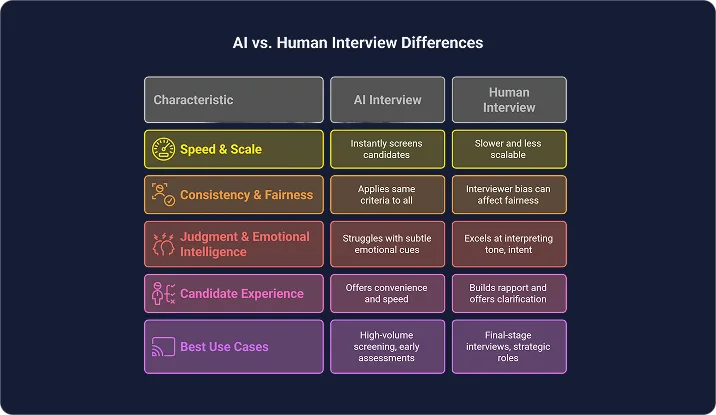
1. Speed & Scale
AI: Instantly screens hundreds of candidates in parallel. By automating early-stage evaluations, AI can reduce time-to-hire by up to 75%, allowing recruiters to move top candidates forward before they drop out.
Human: Slower and less scalable. Reviewing each resume and conducting every interview manually limits throughput and often leads to delays, especially in high-volume hiring.
2. Consistency & Fairness
AI: Applies the same evaluation criteria to every candidate, eliminating inconsistencies caused by mood, fatigue, or subjective preferences. This standardization helps reduce unconscious bias and ensures a level playing field.
Human: Interviewer bias, even if unintentional, can affect fairness, from the tone of questioning to how answers are interpreted. Variability between interviewers can also lead to uneven assessments.
3. Judgment & Emotional Intelligence
AI: Struggles with understanding subtle emotional cues, storytelling, or adapting in real time to unexpected responses. It can miss signs of empathy, leadership potential, or cultural fit.
Human: Excels at interpreting tone, body language, and intent. Humans can ask follow-up questions, probe deeper, and make nuanced judgments, especially valuable for senior roles or ambiguous situations.
4. Candidate Experience
AI: Offers convenience and speed, but some candidates find AI interactions impersonal or difficult to trust. The lack of real-time feedback can also leave applicants unsure about how they performed.
Human: Builds rapport, offers clarification, and creates a more conversational environment. This human touch often improves candidate comfort, engagement, and perception of the employer brand.
5. Best Use Cases
AI: Ideal for high-volume screening, early-stage assessments, and standardized evaluations where speed and fairness are critical.
Human: Best suited for final-stage interviews, strategic roles, or when evaluating culture fit, communication style, or leadership presence.
AI and human interviews aren’t competitors; they’re collaborators. The most effective hiring teams use AI to streamline and standardize the early stages, then rely on human judgment to dig deeper in the final rounds.
Should You Trust an AI to Interview Candidates?
Yes, AI interviews can be trusted when designed transparently, trained on diverse data, and used with human oversight. They’re not a shortcut to cut corners; they’re a tool to create more structured, scalable, and fair evaluation processes.
AI interviewing systems apply consistent scoring criteria across all applicants, helping eliminate the variability and unconscious bias that often affect human-led interviews. They can also analyze large volumes of candidate responses with speed and precision, surfacing insights from communication style, response structure, and even behavioral signals.
But trust in AI doesn’t come automatically. It hinges on two critical factors: algorithmic integrity and process transparency.
Poorly designed or unmonitored models can perpetuate bias, especially when trained on historical hiring data that reflects systemic inequalities. Additionally, when candidates don’t understand how they’re being assessed, the process can feel impersonal or even unfair.
Benefits of Using AI for Interviews
AI interviews drive measurable improvements across hiring speed, consistency, and candidate quality, without compromising fairness. For teams struggling with resume overload, manual scheduling, or inconsistent evaluations, AI is no longer a nice-to-have; it’s a strategic advantage.
Here’s how AI transforms the interview process:
Time and Cost Savings
AI reduces the manual load on recruitment teams by automating the most time-intensive parts of the process, from resume screening to interview scheduling. As a result:
Organizations using AI in hiring have cut recruitment costs by up to 30-80%, depending on process maturity and volume.
Tasks that once took weeks, like reviewing hundreds of resumes or conducting initial interviews, can now be completed in minutes.
Companies report up to 70% reductions in time-to-hire, enabling faster access to top candidates before they drop out of the funnel.
By automating repeatable work, AI frees recruiters to focus on strategic activities like relationship building, employer branding, and closing offers. Some enterprises have reported annual savings of $1M or more through reduced turnaround and improved retention.
Scalability for High-Volume Hiring
AI interview systems are built to handle hiring at scale, processing thousands of applicants concurrently without sacrificing quality.
Companies facing seasonal spikes or rapid expansion can increase candidate throughput by up to 50%, without increasing headcount.
AI-driven platforms automate logistics-heavy steps like interview scheduling, follow-ups, and status updates, dramatically reducing recruiter fatigue.
This scalability is especially valuable in industries like retail, logistics, and BPO, where hiring surges are frequent and urgent.
InterWiz makes this seamless by combining AI-led interviews with skill assessments and adaptive workflows, so teams can confidently evaluate 500 or 5,000 candidates using the same consistent structure.
Better Quality Hires Through Standardized Evaluation
AI doesn’t just accelerate hiring, it also improves its accuracy and effectiveness:
Unlike human interviewers, AI applies the same scoring criteria to every candidate, eliminating bias from subjective judgments.
Predictive analytics models surface traits shared by high-performing employees, enabling more informed, data-backed decisions.
AI-led interviews have been shown to identify qualified candidates earlier, improving downstream success rates in human interviews and onboarding.
This consistency leads to stronger shortlists, fewer false positives, and better long-term performance from new hires.
Limitations and Challenges of AI Interviews
While AI interviews offer major advantages in speed and scale, they come with important risks and limitations that hiring teams must address:
Embedded bias in training data can lead to discriminatory outcomes, especially if historical hiring patterns reflect systemic inequalities. AI doesn’t eliminate bias; it can scale it if left unchecked.
Over-reliance on algorithmic outputs may discourage critical thinking and independent judgment among recruiters, reducing their ability to challenge flawed recommendations or spot high-potential outliers.
Opaque or “black box” models often lack explainability, making it difficult for hiring teams to understand how decisions are made or for candidates to appeal unfair outcomes.
Candidates often feel discomfort or mistrust when interviewed by AI, especially when no human interaction is involved. This can damage the employer brand and deter top talent.
Lack of transparency in how AI evaluates candidates, including what data is used and how it’s scored, raises concerns about fairness, particularly when no feedback is provided.
Privacy risks emerge when AI systems collect and process sensitive data (e.g., facial expressions, tone, or behavioral traits) without proper safeguards or consent protocols.
Legal compliance challenges include potential violations of anti-discrimination laws (e.g., ADA, EEOC), data protection regulations, and emerging AI-specific mandates in jurisdictions like Illinois, New York, and the EU.
Negative candidate experience can result from impersonal interactions, lack of feedback, and limited recourse, especially if applicants feel like they're being judged by a machine rather than understood as individuals.
Creative thinking and nuanced evaluations may be stifled if recruiters lean too heavily on AI, particularly in roles requiring judgment, adaptability, or cultural alignment.
AI interviews should enhance, not replace, human judgment. When paired with human oversight and ethical implementation, it offers a balanced approach that combines efficiency with fairness.
Choosing the Right AI Interview Tool: Why InterWiz Stands Out
With dozens of AI-powered interview tools in the market, choosing the right one can be overwhelming. Most platforms promise efficiency and automation, but few deliver the depth, flexibility, and insight needed for modern hiring teams. InterWiz breaks that mold.
Rather than simply automating interviews, InterWiz is built to enhance how teams evaluate talent, combining adaptive assessments, workflow automation, behavioral analysis, and post-interview ranking in one cohesive system. In this section, we’ll explore how InterWiz differs from traditional AI tools and why it’s emerging as the go-to platform for hiring teams seeking both speed and precision.
InterWiz: A Smarter, More Structured Way to Interview with AI
Most AI interview platforms focus on speed and automation. InterWiz goes further, offering an adaptive, performance-first system that helps hiring teams evaluate better, rank smarter, and move faster, without sacrificing decision quality.
What makes InterWiz different isn’t just the technology; it’s the structure. From interview design to candidate ranking, every step is built around precision, context, and recruiter control.
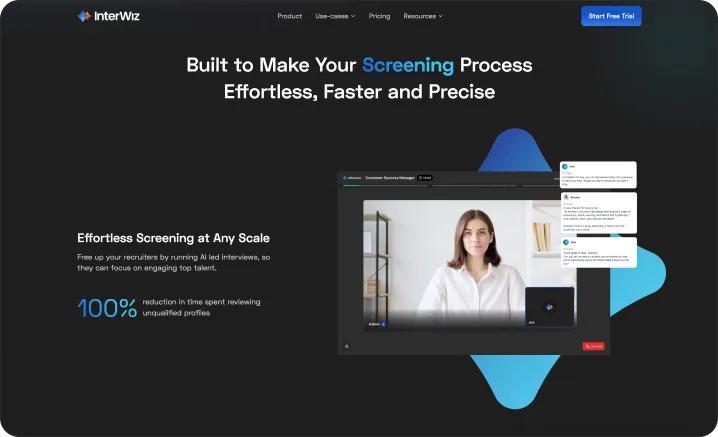
Here’s how InterWiz leads:
1. Prebuilt + Custom Interview Templates
Start fast with 80+ ready-to-use interview templates created by experts, or build your own using a flexible question bank that covers technical, analytical, communication, and behavioral dimensions.
2. Role-Specific, Weighted Assessments
Recruiters can assign custom weightage to each test component, like 40% communication, 30% technical, 30% behavioral, ensuring scoring reflects what matters most for the role.
3. Automated Interview Scheduling
InterWiz removes the back-and-forth of scheduling entirely. Candidates receive interview invites based on your availability, and the system handles time zone detection, calendar syncing, reminders, and follow-ups, all automatically.
4. Adaptive Interviews with Branching Logic
Instead of one-size-fits-all questions, InterWiz adapts interview flow in real time based on candidate responses, delivering more personalized, relevant, and insightful assessments.
5. Candidate Ranking + Actionable Reports
After each interview, InterWiz ranks candidates based on weighted scores in technical, communication, and behavioral skills. It also generates a report highlighting strengths, weaknesses, and role fit, helping recruiters make clear decisions quickly.
6. Built-In Proctoring and Integrity Checks
Test integrity is enforced automatically. InterWiz uses integrated auto-proctoring and behavioral monitoring to detect anomalies and assign a trust score to each session, no plugins or manual review required.
Other Notable Interview Tools in the Market
While InterWiz offers a uniquely comprehensive approach, several other AI interview platforms are also helping organizations modernize their hiring processes. Each tool brings distinct capabilities to the table, often excelling in specific areas of candidate assessment.
HireVue: HireVue analyzes video interviews using AI to assess verbal and nonverbal cues such as tone, facial expressions, and word choice. It’s often used for early-stage screening, aiming to standardize evaluations while saving recruiters time.
Sapia.ai: Sapia uses a unique conversational AI model to conduct text-based interviews via chat. It analyzes candidates’ language patterns to assess traits like empathy, resilience, and problem-solving. With a strong emphasis on fairness, explainability, and ethical AI, Sapia is used widely in retail, BPO, and high-volume recruitment settings.
Harver: Harver offers a comprehensive suite of AI-powered pre-employment assessments, including cognitive ability, culture fit, and behavioral evaluations. It’s used by companies like McDonald’s and Booking.com to streamline high-volume hiring through scientifically validated, bias-reducing assessments that replace traditional resumes.
When to Use AI Interviews in the Hiring Funnel
AI interviews can be strategically integrated into various stages of the hiring funnel to enhance the efficiency and quality of the recruitment process. From initial screening to in-depth evaluations and final stage support, AI interviews offer valuable insights and streamline the hiring process.
We’ll explore the ideal stages for implementing AI interviews and the benefits they provide at each stage.
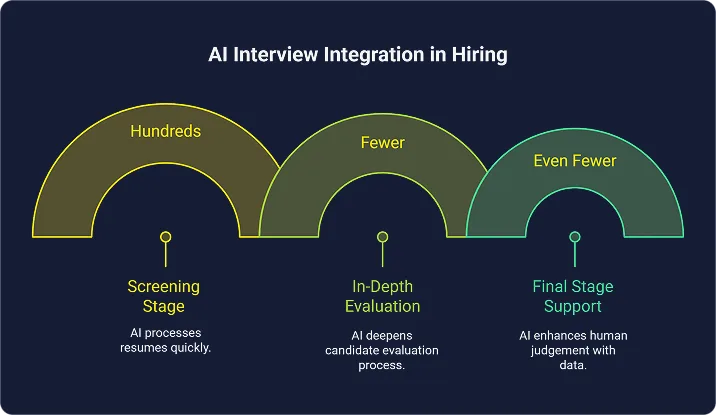
1. Screening Stage: From Resume Filtering to Smart Assessments
AI tools can process hundreds of resumes in minutes, not weeks, accelerating early-stage decisions without compromising accuracy. Rather than relying on keyword matching alone, AI systems evaluate structured data (like skills and experience) against job requirements to identify high-potential candidates that traditional filters might miss.
Key value points:
Analyzes resumes against predefined criteria to shortlist relevant candidates
Automates skill-based assessments to move beyond surface-level qualifications
Reduces bias by prioritizing qualifications over pedigree
Speeds up time-to-screen, enabling faster funnel movement
After resume parsing, AI interviews can automatically trigger initial assessments, such as coding tasks, language fluency tests, or situational judgment scenarios, helping teams prioritize candidates based on real ability from the start.
2. In-Depth Evaluation: Boosting Mid-Funnel Efficiency
At this stage, AI interviews deepen the evaluation process by assessing not only what candidates say, but how they say it. Structured formats enable automated scoring of verbal and nonverbal cues, communication clarity, and problem-solving approaches.
Key value points:
Evaluates structured responses, behavioral signals, and engagement patterns
Automates interview delivery and scoring, removing scheduling bottlenecks
Provides standardized, bias-reduced evaluations across all candidates
Flag high-potential candidates based on data-driven performance insights
This mid-funnel intelligence helps recruiters identify who’s genuinely job-ready, especially in high-volume or technical roles, while significantly reducing time-to-hire.
3. Final Stage Support: Enhancing Human Judgment with Data
In the final rounds, AI adds a layer of analytical support that complements human intuition. Tools can generate comprehensive reports highlighting candidate strengths, red flags, and interview consistency, giving hiring managers additional signals to weigh.
Key value points:
Delivers structured performance summaries to inform final decisions
Supports objectivity by highlighting strengths beyond personal impressions
Ensures consistency across multiple interviewers and rounds
That said, AI isn’t designed to replace gut instinct where it matters most, especially when assessing emotional intelligence or team dynamics. The best outcomes come from a blended approach, where AI handles structured evaluations and humans make the final call.
How to Prepare Candidates for an AI Interview
AI interviews are only as effective as the people participating in them, which is why preparation matters. For candidates, readiness builds confidence and improves performance. For employers, it ensures that the technology supports rather than hinders fair evaluations.
Below are best practices for both sides of the table to create a smooth, trustworthy AI interview experience.
For Employers: Set the Stage for Interview Success
Employers play a crucial role in shaping how candidates perceive and perform in AI-led interviews. Here’s how to ensure clarity, fairness, and confidence from the start:
Be transparent about the interview format, structure, and how the AI system evaluates responses. Ambiguity increases anxiety - clarity builds trust.
Share preparation materials, such as example questions, scoring rubrics, or even mock interview tools. This levels the playing field for candidates from diverse backgrounds.
Offer practice runs to simulate the AI experience. Giving candidates a chance to rehearse reduces nervousness and improves performance consistency.
Make the interface intuitive and accessible across devices to avoid technical friction that distracts from candidate performance.
Maintain ethical oversight by regularly reviewing AI scoring patterns for potential bias or fairness concerns.
Involve humans where it matters - supplement automated evaluations with human judgment, especially for final decisions or borderline candidates.
When candidates know what to expect, they’re more likely to engage authentically, and that makes AI-powered insights more meaningful.
For Candidates: Treat AI Like a Human Interviewer
Just because it’s AI-led doesn’t mean it’s casual. Candidates should approach AI interviews with the same preparation and professionalism as they would an in-person session.
Practice speaking clearly and confidently in front of a camera. Record yourself or use tools like Big Interview to identify habits that may affect your delivery.
Structure answers using the STAR method (Situation, Task, Action, Result) to provide thoughtful, complete responses that AI can parse and evaluate effectively.
Avoid scripted responses - AI tools are designed to detect patterns and inconsistencies. Speak in your own words, and let your personality come through.
Keep your environment distraction-free - a clean background, strong lighting, and stable internet make a stronger impression.
Maintain eye contact with the camera, smile, and project positive body language. Nonverbal cues still matter, even to AI.
Understand the tech: If the company shares what tool is being used, look it up. Familiarity reduces uncertainty and boosts confidence.
The Future of AI Interviews
AI interviews are evolving fast, not just automating processes, but fundamentally reshaping how hiring decisions are made. From adaptive formats to predictive hiring models, the next generation of AI tools is designed to go beyond efficiency and toward personalization, fairness, and long-term impact.
But as this technology matures, so do the questions around ethics, transparency, and the role of human judgment. The future won’t be fully automated; it will be AI-enhanced, human-guided, and outcome-driven.
Smarter, More Adaptive Interviews
AI interviews are becoming increasingly dynamic, adapting in real time to each candidate’s responses. Instead of using fixed question sets, adaptive AI tailors follow-up questions based on previous answers, much like a skilled interviewer would. This creates more natural, candidate-specific evaluations while eliminating the one-size-fits-all problem many tools face.
These personalized flows not only improve candidate engagement but also increase fairness by matching question complexity to candidate performance. The result: stronger signal on real skills, fewer false negatives, and a more inclusive interview experience.
Predictive Hiring Powered by Data
AI’s future in hiring isn’t just reactive, it’s predictive. By analyzing behavioral data, skill assessments, and past hiring outcomes, predictive models can forecast candidate success with increasing accuracy.
Organizations that embed predictive analytics into their hiring processes report measurable gains, including:
Up to 30% improvement in employee retention, according to internal studies from AI vendors.
Reduced mis-hires, thanks to early signals on performance and culture fit.
Faster hiring decisions, as recruiters are guided by model-backed insights.
This shift toward prediction over gut feel is setting a new standard for strategic hiring.
Ethics and Human Collaboration Stay Central
Despite the sophistication of these tools, AI still can’t assess emotional intelligence, team dynamics, or cultural nuance the way people can. That’s why the future of hiring will be hybrid, with AI handling what it’s best at (speed, structure, standardization), and humans driving what they do best (judgment, empathy, and trust).
To get this balance right, organizations must:
Maintain human oversight throughout the process.
Ensure transparency in AI use, especially when candidates are being evaluated algorithmically.
Regularly audit systems for bias, fairness, and data privacy compliance.
When used responsibly, AI won’t replace human intuition; it will enhance it. The companies that win in the future will be those that combine machine intelligence with human insight to make hiring smarter, faster, and fairer.
Bottom Line: Is AI the Future of Interviews?
AI is no longer a nice-to-have in recruiting; it’s rapidly becoming a core part of modern hiring infrastructure. From automating initial screenings to surfacing data-driven insights, AI interviews offer tangible improvements in speed, scalability, and standardization. In fact, recent industry surveys show that over 20% of companies are already using AI-powered tools in their interview process, with adoption expected to accelerate in the next few years.
But while AI excels at structure and scale, it’s not a replacement for human judgment, nor should it be. Critical decisions like evaluating emotional intelligence, assessing team fit, or building rapport still require human insight. That’s why the future of interviewing won’t be fully automated; it will be hybrid.
The most effective teams will use AI to handle the repetitive and bias-prone parts of interviewing, like resume filtering, skills assessments, and preliminary screening, while empowering recruiters to focus on deeper evaluations and relationship-building. This blend ensures hiring remains efficient and fair, without losing the human touch.
As AI becomes more embedded in the hiring funnel, companies must also commit to transparency, candidate trust, and ethical safeguards. The promise of AI in hiring isn’t just about faster decisions; it’s about making better ones, together.
FAQs about Interviewing with AI
Are AI interviews replacing human recruiters?
AI interviews aren't replacing human recruiters; they’re actually helping them by handling initial screenings, so recruiters can zero in on more important factors like cultural fit and communication skills.
How accurate are AI-led interviews?
AI-led interviews can be quite effective, often outperforming traditional resume screenings by providing data-driven insights into candidates. However, it's important to be aware of potential biases if the AI isn't properly managed.
What industries are using AI interviews the most?
Tech, finance, and healthcare are leading the way in using AI interviews to streamline their hiring processes, with companies like Mastercard and Electrolux adopting these systems to handle large volumes of applications more efficiently.
What are the core technologies behind AI interviews?
AI interviews rely on natural language processing (NLP), machine learning, and real-time analysis to assess candidates. Together, these technologies help evaluate both what candidates say and how they present themselves.
How can candidates prepare for an AI interview?
To ace your AI interview, treat it like any professional interview by minimizing distractions and practicing your responses on video. Use the STAR method for structuring your answers, and make sure to familiarize yourself with the relevant technologies to tailor your responses better.
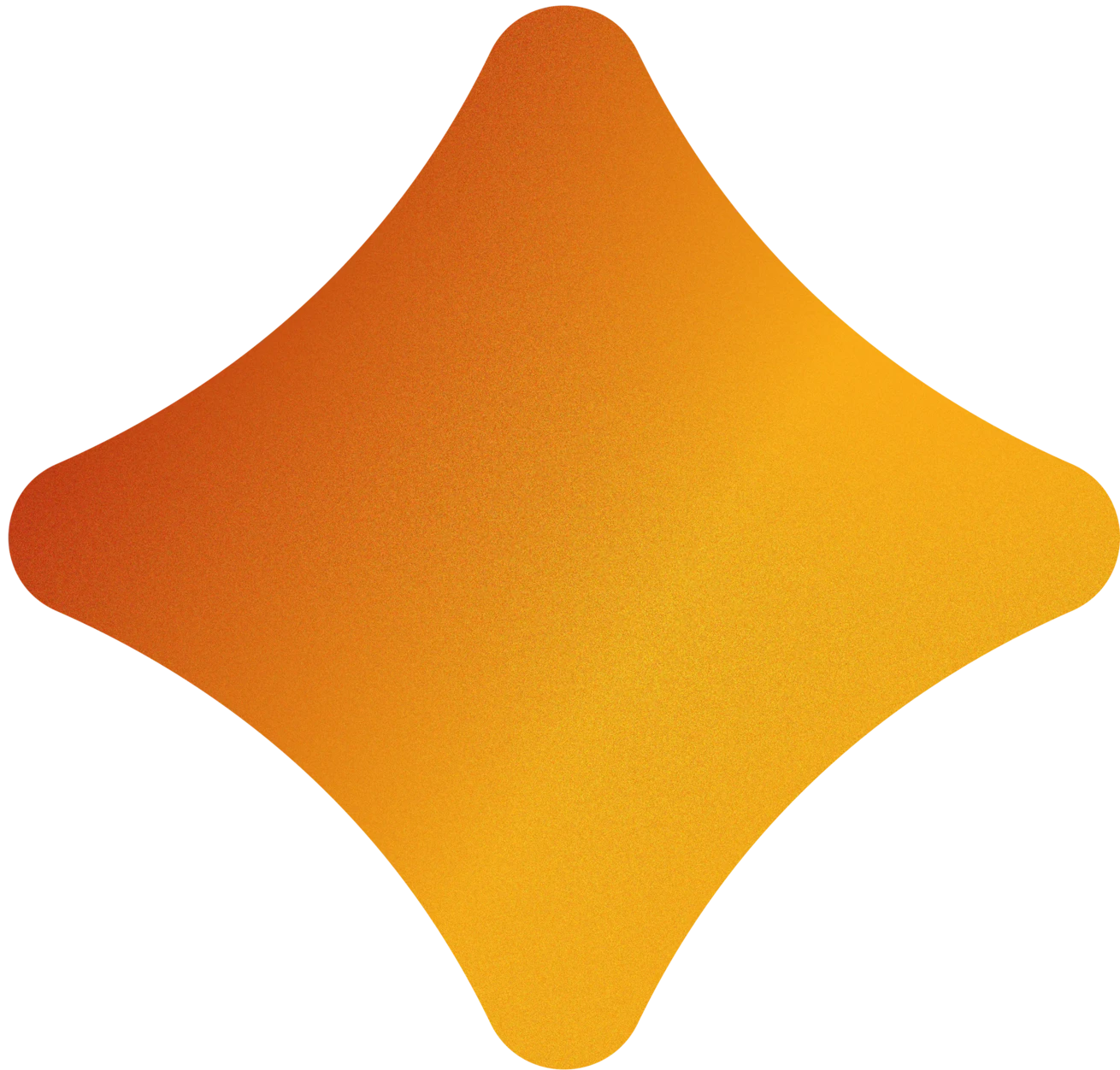
High Quality Screening with AI Interviews
Automated interviews built for speed, scale, and accuracy.
🔥 Full features, no credit card required.